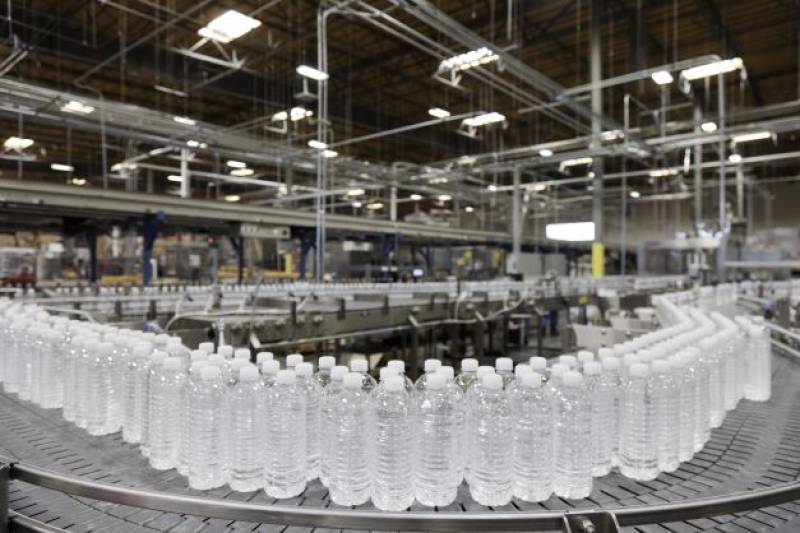- Region
- Vega baja
- Marina Alta
- Marina Baixa
- Alicante
- Baix Vinalopo
- Alto & Mitja Vinalopo
-
ALL TOWNS
- ALICANTE TOWNS
- Albatera
- Alfaz Del Pi
- Alicante City
- Alcoy
- Almoradi
- Benitatxell
- Bigastro
- Benferri
- Benidorm
- Calosa de Segura
- Calpe
- Catral
- Costa Blanca
- Cox
- Daya Vieja
- Denia
- Elche
- Elda
- Granja de Rocamora
- Guardamar del Segura
- Jacarilla
- Los Montesinos
- Orihuela
- Pedreguer
- Pilar de Horadada
- Playa Flamenca
- Quesada
- Rafal
- Redovan
- Rojales
- San Isidro
- Torrevieja
- Comunidad Valenciana
article_detail
Date Published: 02/04/2024
Bottled water usage rises in Spain despite tap water initiative
Consumption of bottled water is surging in Spain, creating a plastics pollution problem that could be affecting health

Despite legal efforts to promote tap water consumption and reduce plastic waste, Spain’s bottled water industry continues to thrive, reaching an all-time high of almost 8.7 billion litres in 2022, according to statistics from the Geological and Mining Industry. This figure marks a 4.8% increase from the previous record, highlighting the sector’s resilience against regulatory pressures.
The push for tap water availability began in 2020, with proposals aiming to curb single-use plastic consumption. However, the bottling industry, represented by Aneabe, vehemently opposed these measures, citing concerns about the impact on their operations and disputing the necessity of such regulations.
In April 2022, legislation requiring bars and restaurants to offer tap water alongside bottled options came into effect. Despite criticisms from industry representatives, the law aimed to reduce the environmental footprint of disposable containers. Nevertheless, data indicates a significant rise in bottled water production, underscoring the industry’s robustness.
Related story: Is the tap water safe to drink in Spain?
Spain’s consumption of bottled water remains significant, with 2022 figures showing a consumption of 2.9 billion litres, a slight decrease from the previous year but still higher than pre-pandemic levels. This consumption trend underscores Spain’s status as a global consumer power in the bottled water market, with per capita consumption and expenditure ranking among the highest globally.
This is in spite of the fact that, in general, the tap water in Spain is perfectly safe to drink in most areas and the supply of fresh drinking water is rarely affected by the increasingly common droughts that the country is suffering.
Despite the sector’s economic significance, concerns persist regarding its environmental impact. Environmental organisations highlight the excessive water usage and plastic waste generated by bottled water production, calling attention to the ecological repercussions.
Recent studies further illuminate the environmental concerns surrounding bottled water consumption. Research from the UN University Institute for Water, Environment, and Health highlights the local impacts of water withdrawals and waste mismanagement associated with the industry.
“Although small compared to large consumers such as irrigated agriculture, they can have significant impacts at the local level,” says the study, which also draws attention to the problem of the waste which is generated by bottled water, “which is not recycled but ends up in landfills”.
Similarly, studies conducted by organisations like Greenpeace and Ecologists in Action emphasise the broader environmental consequences of plastic pollution.
In addition to environmental concerns, emerging research reveals potential health risks associated with bottled water consumption. Studies from Columbia University have detected high levels of nanoplastics in bottled water, raising concerns about their potential adverse effects on human health.
“Nanoplastics are so small that, unlike microplastics, they can pass through the gut and lungs. They can invade cells,” said researchers.
Despite these challenges, the bottled water industry remains a dominant force in Spain, prompting continued debate over the balance between economic interests, environmental sustainability and public health concerns. As efforts to address these issues evolve, stakeholders must navigate complex trade-offs to ensure a sustainable future for Spain’s water consumption habits.
staff.inc.ali
Loading
See more environmental news about Spain:
OR
Sign up for the Spanish News Today Editors Roundup Weekly Bulletin to get a comprehensive email with all the week’s news for Spain, Murcia, Alicante and Andalucía.
Get a sneak peek – here are a few of our recent Subscription Bulletins:
Discount Special Offer subscription:
36.95€ for 48 Editor’s Weekly News Roundup bulletins!
Please CLICK THE BUTTON to subscribe.
Contact Murcia Today: Editorial 000 000 000 /
Office 000 000 000



























